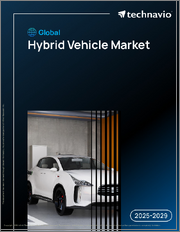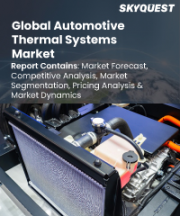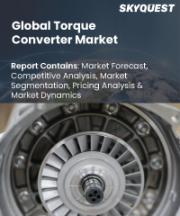
|
시장보고서
상품코드
1545611
반자율주행 및 자율주행 트럭 및 버스 시장 - 세계 및 지역별 분석 : 용도별, 추진력별, 자율주행 수준별, 차량 유형별, ADAS 기능별, 센서 유형별, 중량급별, 지역별 - 분석 및 예측(2024-2034년)Semi-Autonomous and Autonomous Trucks and Buses Market - A Global and Regional Analysis: Focus on Application, Propulsion, Level of Autonomy, Vehicle Type, ADAS Features, Sensor Type, Weight Class, and Region - Analysis and Forecast, 2024-2034 |
||||||
반자율주행 및 자율주행 트럭 및 버스 시장 규모는 다양한 시장 촉진요인에 힘입어 괄목할만한 성장을 보이고 있습니다.
낙관적인 시나리오에서는 2024년 439억 6,000만 달러로 CAGR 11.89% 성장하여 2034년에는 1,352억 3,000만 달러에 달할 것으로 예상됩니다.
반자율주행 및 자율주행 트럭 및 버스 시장의 성장을 촉진하는 요인 중 하나는 운송 부문의 교통 안전과 업무 효율성 강화에 대한 관심이 높아지고 있다는 점입니다. 반자율 및 자율주행 차량에는 적응형 크루즈 컨트롤, 차선 유지 지원, 자동 제동 시스템 등 첨단 기술이 탑재되어 있어 인적 오류 및 사고 위험을 크게 줄일 수 있습니다. 또한, 인건비 절감과 연료 소비 최적화를 통한 비용 절감 가능성으로 인해 차량 사업자들은 이러한 기술을 채택하고 있습니다.
| 주요 시장 통계 | |
|---|---|
| 예측 기간 | 2024-2034년 |
| 2024년 평가 | 439억 6,000만 달러 |
| 2034년 전망 | 1,352억 3,000만 달러 |
| CAGR | 11.89% |
세계 반자율주행 및 자율주행 트럭 및 버스 시장의 또 다른 촉진요인은 교통 안전 향상과 교통 체증 완화를 위한 규제가 강화되고 있다는 점입니다. 각국 정부는 ADAS(첨단 운전자 보조 시스템)와 자율주행 기술의 통합을 의무화하는 정책을 시행하여 인적 오류를 최소화하고 운송 효율성을 높이고 있습니다. 이러한 규제는 제조업체와 차량 운영사들이 새로운 안전 기준을 준수하기 위해 노력하는 가운데 반자율주행차와 자율주행차의 채택을 가속화하고 있습니다. 또한, 배기가스 배출량을 줄이고 연료 효율성을 높이기 위한 노력은 전기 및 하이브리드 자율주행 트럭과 버스의 개발 및 배치를 촉진하여 시장 성장을 더욱 촉진하고 있습니다.
북미는 반자율주행 및 자율주행 트럭 및 버스 시장을 선도하고 있으며, 국가별 세분화에서 미국이 선두를 달리고 있습니다. 이 지역의 우위는 첨단 인프라, 연구개발에 대한 막대한 투자, 규제 당국의 강력한 지원의 조합에 기인합니다. 특히 미국은 자율주행 시스템의 선구자인 다임러 트럭 AG(Daimler Truck AG)와 같은 선도기업을 포함한 탄탄한 기술 기업 및 자동차 제조업체 생태계의 혜택을 누리고 있습니다. 이들 기업의 AI, 머신러닝, 센서 기술에 대한 전문 지식은 자동차의 성능, 안전성, 신뢰성을 향상시키는 혁신을 주도하고 있습니다. 또한, 스마트 교통 프로젝트에 대한 정부의 우호적인 정책과 막대한 자금 지원은 반자율 및 자율주행 트럭과 버스의 도입을 촉진하고 있으며, 북미는 시장 성장의 주요 성장 동력이 되고 있습니다.
이 보고서는 세계 반자율주행 및 자율주행 트럭 및 버스 시장을 조사하여 시장 개요와 함께 용도별, 추진동력별, 자율주행 수준별, 차량 유형별, ADAS 기능별, 센서 유형별, 중량급별, 지역별 동향, 시장 진입 기업 개요 등을 정리하여 전해드립니다. 을 제공하고 있습니다.
목차
주요 요약
제1장 시장 : 업계 전망
- 동향 : 현재 및 향후의 영향 평가
- 공급망 개요
- R&D 리뷰
- 규제 상황
- 이해관계자 분석
- 주요 세계적 이벤트의 영향 분석
- 시장 역학 개요
제2장 반자율주행 및 자율주행 트럭 및 버스 시장(용도별)
- 용도 세분화
- 용도 개요
- 반자율주행 및 자율주행 트럭 및 버스 시장(용도별)
제3장 반자율주행 및 자율주행 트럭 및 버스 시장(제품별)
- 제품 세분화
- 제품 개요
- 반자율주행 및 자율주행 트럭 및 버스 시장(추진력별)
- 반자율주행 및 자율주행 트럭 및 버스 시장(자율주행 레벨별)
- 반자율주행 및 자율주행 트럭 및 버스 시장(차종별)
- 반자율주행 및 자율주행 트럭 및 버스 시장(ADAS 기능별)
- 반자율주행 및 자율주행 트럭 및 버스 시장(센서 유형별)
- 반자율주행 및 자율주행 트럭 및 버스 시장(중량 클래스별)
제4장 반자율주행 및 자율주행 트럭 및 버스 시장(지역별)
- 반자율주행 및 자율주행 트럭 및 버스 시장 - 지역별
- 북미
- 유럽
- 아시아태평양
- 기타 지역
제5장 기업 개요
- 향후 전망
- 지리적 평가
- Daimler Truck AG
- AB Volvo
- Mitsubishi Fuso Truck and Bus Corporation
- Navistar Inc
- Nikola Corporation
- PACCAR Inc.
- Denso Corporation
- Scania
- ISUZU MOTORS
- MAN Truck & Bus AG
- BYD Motors
- Tata Motors Limited
- Hyundai Motor Company
- General Motors
- Ford Motor Company
제6장 조사 방법
ksm 24.09.06Introduction to Semi-Autonomous and Autonomous Trucks and Buses Market
The semi-autonomous and autonomous trucks and buses market has been undergoing significant growth, propelled by various key factors and market drivers. In an optimistic scenario, the market would be evaluated at a valuation of $43.96 billion in 2024 and projected to expand at a CAGR of 11.89% to reach $135.23 billion by 2034.
A primary driver for the growth of the semi-autonomous and autonomous trucks and buses market is the increasing focus on enhancing road safety and operational efficiency in the transportation sector. Semi-autonomous and autonomous vehicles are equipped with advanced technologies such as adaptive cruise control, lane-keeping assistance, and automated braking systems, which significantly reduce the risk of human error and accidents. Moreover, the potential for cost savings through reduced labor costs and optimized fuel consumption is encouraging fleet operators to adopt these technologies.
| KEY MARKET STATISTICS | |
|---|---|
| Forecast Period | 2024 - 2034 |
| 2024 Evaluation | $43.96 Billion |
| 2034 Forecast | $135.23 Billion |
| CAGR | 11.89% |
Another driving factor in the global semi-autonomous and autonomous trucks and buses market has been the increasingly stringent regulatory landscape aimed at improving road safety and reducing traffic congestion. Governments around the world are implementing policies that mandate the integration of advanced driver-assistance systems (ADAS) and autonomous driving technologies to minimize human error and enhance transportation efficiency. These regulations are accelerating the adoption of semi-autonomous and autonomous vehicles as manufacturers and fleet operators strive to comply with new safety standards. Additionally, the push for reducing emissions and improving fuel efficiency is encouraging the development and deployment of electric and hybrid autonomous trucks and buses, further driving market growth.
North America leads the semi-autonomous and autonomous trucks and buses market by region, with the U.S. at the forefront based on country segmentation. The region's dominance can be attributed to a combination of advanced infrastructure, significant investments in research and development, and strong support from regulatory bodies. The U.S., in particular, benefits from a robust ecosystem of technology firms and automotive manufacturers, including leaders such as Daimler Truck AG, who are pioneering advancements in autonomous driving systems. These companies' expertise in AI, machine learning, and sensor technologies is driving innovations that enhance vehicle performance, safety, and reliability. Additionally, favorable government policies and substantial funding for smart transportation projects are propelling the adoption of semi-autonomous and autonomous trucks and buses, making North America a key player in the market's growth.
Market Segmentation:
Segmentation 1: by Application
- Long-Haul Freight Transportation
- Mining and Construction
- Intercity/Intracity Buses
- Agriculture
- Waste Management
- Logistics and Distribution
- Shuttles
- Medical and Healthcare Transport Services
- Manufacturing
- Military
Segmentation 2: by Propulsion
- Internal Combustion Engine Vehicles
- Electric Vehicles
- Battery Electric Vehicles (BEVs)
- Hybrid Electric Vehicles (HEVs)
- Plug-in Hybrid Electric Vehicles (PHEVs)
Segmentation 3: by Level of Autonomy
- Semi-Autonomous
- Autonomous
Segmentation 4: by Vehicle Type
- Trucks
- Buses
Segmentation 5: by ADAS Features
- Adaptive Cruise Control (ACC)
- Automatic Emergency Braking (AEB)
- Blind Spot Detection (BSD)
- Lane Keep Assist (LKA)
- Intelligent Park Assist (IPA)
- Traffic Jam Assist (TJA)
- Highway Pilot (HP)
- Others
Segmentation 6: by Sensor Type
- LiDAR
- Radar Sensors
- Cameras
- Ultrasonic Sensors
Segmentation 7: by Weight Class
- Light Duty Trucks and Buses
- Medium Duty Trucks and Buses
- Heavy Duty Trucks and Buses
Segmentation 8: by Region
- North America
- Europe
- Asia-Pacific
- Rest-of-the-World
How can this report add value to an organization?
Product/Innovation Strategy: The global semi-autonomous and autonomous trucks and buses market has been extensively segmented based on various categories, such as application, propulsion, level of autonomy, vehicle type, ADAS features, sensor type, and weight class. This can help readers get a clear overview of which segments account for the largest share and which ones are well-positioned to grow in the coming years.
Competitive Strategy: A detailed competitive benchmarking of the players operating in the global semi-autonomous and autonomous trucks and buses market has been done to help the reader understand how players stack against each other, presenting a clear market landscape. Additionally, comprehensive competitive strategies such as partnerships, agreements, and collaborations will aid the reader in understanding the untapped revenue pockets in the market.
Key Market Players and Competition Synopsis
The companies that are profiled have been selected based on thorough secondary research, which includes analyzing company coverage, product portfolio, market penetration, and insights gathered from primary experts.
Some of the prominent companies in this market are:
- Daimler Truck AG
- AB Volvo
- Scania
- Denso Corporation
- General Motors
- Ford Motor Company
Key Questions Answered in this Report:
- What are the main factors driving the demand for semi-autonomous and autonomous trucks and buses market?
- What are the major patents filed by the companies active in the semi-autonomous and autonomous trucks and buses market?
- Who are the key players in thesemi-autonomous and autonomous trucks and buses market, and what are their respective market shares?
- What partnerships or collaborations are prominent among stakeholders in the semi-autonomous and autonomous trucks and buses market?
- What strategies have the key companies adopted to gain a competitive edge in the semi-autonomous and autonomous trucks and buses market?
- What is the futuristic outlook for the semi-autonomous and autonomous trucks and buses market in terms of growth potential?
- What is the current estimation of the semi-autonomous and autonomous trucks and buses market, and what growth trajectory is projected from 2024 to 2034?
- Which application and product segment is expected to lead the market during the forecast period 2024-2034?
- Which regions demonstrate the highest adoption rates forthe semi-autonomous and autonomous trucks and buses market, and what factors contribute to their leadership?
Table of Contents
Executive Summary
Scope and Definition
Market/Product Definition
Key Questions Answered
Analysis and Forecast Note
1. Markets: Industry Outlook
- 1.1 Trends: Current and Future Impact Assessment
- 1.1.1 Integration with Electric Powertrains for Sustainable Transport
- 1.1.2 Advancements in LiDAR, Radar, and 5G Connectivity
- 1.2 Supply Chain Overview
- 1.2.1 Value Chain Analysis
- 1.2.2 Pricing Forecast
- 1.3 R&D Review
- 1.3.1 Patent Filing Trend by Country, by Company
- 1.4 Regulatory Landscape
- 1.5 Stakeholder Analysis
- 1.5.1 Use Case
- 1.5.2 End User and Buying Criteria
- 1.6 Impact Analysis for Key Global Events
- 1.7 Market Dynamics Overview
- 1.7.1 Market Drivers
- 1.7.2 Market Restraints
- 1.7.3 Market Opportunities
2. Semi-Autonomous and Autonomous Trucks and Buses Market (by Application)
- 2.1 Application Segmentation
- 2.2 Application Summary
- 2.3 Semi-Autonomous and Autonomous Trucks and Buses Market (by Application)
- 2.3.1 Long-Haul Freight Transportation
- 2.3.2 Mining and Construction
- 2.3.3 Intercity/Intracity Buses
- 2.3.4 Agriculture
- 2.3.5 Waste Management
- 2.3.6 Logistics and Distribution
- 2.3.7 Shuttles
- 2.3.8 Medical and Healthcare Transport Services
- 2.3.9 Manufacturing
- 2.3.10 Military
3. Semi-Autonomous and Autonomous Trucks and Buses Market (by Product)
- 3.1 Product Segmentation
- 3.2 Product Summary
- 3.3 Semi-Autonomous and Autonomous Trucks and Buses Market (by Propulsion)
- 3.3.1 Internal Combustion Vehicles
- 3.3.2 Electric Vehicles
- 3.3.2.1 Battery Electric Vehicles (BEV)
- 3.3.2.2 Hybrid Electric Vehicles (HEV)
- 3.3.2.3 Plug-in Hybrid Electric Vehicles (PHEV)
- 3.4 Semi-Autonomous and Autonomous Trucks and Buses Market (by Level of Autonomy)
- 3.4.1 Semi-Autonomous
- 3.4.2 Autonomous
- 3.5 Semi-Autonomous and Autonomous Trucks and Buses Market (by Vehicle Type)
- 3.5.1 Trucks
- 3.5.2 Buses
- 3.6 Semi-Autonomous and Autonomous Trucks and Buses Market (by ADAS Features)
- 3.6.1 Adaptive Cruise Control (ACC)
- 3.6.2 Automatic Emergency Braking (AEB)
- 3.6.3 Blind Spot Detection (BSD)
- 3.6.4 Lane Keep Assist (LKA)
- 3.6.5 Intelligent Park Assist (IPA)
- 3.6.6 Traffic Jam Assist (TJA)
- 3.6.7 Highway Pilot (HP)
- 3.6.8 Others
- 3.7 Semi-Autonomous and Autonomous Trucks and Buses Market (by Sensor Type)
- 3.7.1 LiDAR
- 3.7.2 Radar Sensors
- 3.7.3 Cameras
- 3.7.4 Ultrasonic Sensors
- 3.8 Semi-Autonomous and Autonomous Trucks and Buses Market (by Weight Class)
- 3.8.1 Light Duty Trucks and Buses
- 3.8.2 Medium Duty Trucks and Buses
- 3.8.3 Heavy Duty Trucks and Buses
4. Semi-Autonomous and Autonomous Trucks and Buses Market (by Region)
- 4.1 Semi-Autonomous and Autonomous Trucks and Buses Market - by Region
- 4.2 North America
- 4.2.1 Regional Overview
- 4.2.2 Driving Factors for Market Growth
- 4.2.3 Factors Challenging the Market
- 4.2.4 Application
- 4.2.5 Product
- 4.2.6 U.S.
- 4.2.6.1 Market by Application
- 4.2.6.2 Market by Product
- 4.2.7 Canada
- 4.2.7.1 Market by Application
- 4.2.7.2 Market by Product
- 4.2.8 Mexico
- 4.2.8.1 Market by Application
- 4.2.8.2 Market by Product
- 4.3 Europe
- 4.3.1 Regional Overview
- 4.3.2 Driving Factors for Market Growth
- 4.3.3 Factors Challenging the Market
- 4.3.4 Application
- 4.3.5 Product
- 4.3.6 Germany
- 4.3.6.1 Market by Application
- 4.3.6.2 Market by Product
- 4.3.7 France
- 4.3.7.1 Market by Application
- 4.3.7.2 Market by Product
- 4.3.8 U.K.
- 4.3.8.1 Market by Application
- 4.3.8.2 Market by Product
- 4.3.9 Italy
- 4.3.9.1 Market by Application
- 4.3.9.2 Market by Product
- 4.3.10 Rest-of-Europe
- 4.3.10.1 Market by Application
- 4.3.10.2 Market by Product
- 4.4 Asia-Pacific
- 4.4.1 Regional Overview
- 4.4.2 Driving Factors for Market Growth
- 4.4.3 Factors Challenging the Market
- 4.4.4 Application
- 4.4.5 Product
- 4.4.6 China
- 4.4.6.1 Market by Application
- 4.4.6.2 Market by Product
- 4.4.7 Japan
- 4.4.7.1 Market by Application
- 4.4.7.2 Market by Product
- 4.4.8 India
- 4.4.8.1 Market by Application
- 4.4.8.2 Market by Product
- 4.4.9 South Korea
- 4.4.9.1 Market by Application
- 4.4.9.2 Market by Product
- 4.4.10 Rest-of-Asia-Pacific
- 4.4.10.1 Market by Application
- 4.4.10.2 Market by Product
- 4.5 Rest-of-the-World
- 4.5.1 Regional Overview
- 4.5.2 Driving Factors for Market Growth
- 4.5.3 Factors Challenging the Market
- 4.5.4 Application
- 4.5.5 Product
- 4.5.6 South America
- 4.5.6.1 Market by Application
- 4.5.6.2 Market by Product
- 4.5.7 Middle East and Africa
- 4.5.7.1 Market by Application
- 4.5.7.2 Market by Product
5. Companies Profiled
- 5.1 Next Frontiers
- 5.2 Geographic Assessment
- 5.2.1 Daimler Truck AG
- 5.2.1.1 Overview
- 5.2.1.2 Top Products/Product Portfolio
- 5.2.1.3 Top Competitors
- 5.2.1.4 Target Customers
- 5.2.1.5 Key Personnel
- 5.2.1.6 Analyst View
- 5.2.1.7 Market Share
- 5.2.2 AB Volvo
- 5.2.2.1 Overview
- 5.2.2.2 Top Products/Product Portfolio
- 5.2.2.3 Top Competitors
- 5.2.2.4 Target Customers
- 5.2.2.5 Key Personnel
- 5.2.2.6 Analyst View
- 5.2.2.7 Market Share
- 5.2.3 Mitsubishi Fuso Truck and Bus Corporation
- 5.2.3.1 Overview
- 5.2.3.2 Top Products/Product Portfolio
- 5.2.3.3 Top Competitors
- 5.2.3.4 Target Customers
- 5.2.3.5 Key Personnel
- 5.2.3.6 Analyst View
- 5.2.3.7 Market Share
- 5.2.4 Navistar Inc
- 5.2.4.1 Overview
- 5.2.4.2 Top Products/Product Portfolio
- 5.2.4.3 Top Competitors
- 5.2.4.4 Target Customers
- 5.2.4.5 Key Personnel
- 5.2.4.6 Analyst View
- 5.2.4.7 Market Share
- 5.2.5 Nikola Corporation
- 5.2.5.1 Overview
- 5.2.5.2 Top Products/Product Portfolio
- 5.2.5.3 Top Competitors
- 5.2.5.4 Target Customers
- 5.2.5.5 Key Personnel
- 5.2.5.6 Analyst View
- 5.2.5.7 Market Share
- 5.2.6 PACCAR Inc.
- 5.2.6.1 Overview
- 5.2.6.2 Top Products/Product Portfolio
- 5.2.6.3 Top Competitors
- 5.2.6.4 Target Customers
- 5.2.6.5 Key Personnel
- 5.2.6.6 Analyst View
- 5.2.6.7 Market Share
- 5.2.7 Denso Corporation
- 5.2.7.1 Overview
- 5.2.7.2 Top Products/Product Portfolio
- 5.2.7.3 Top Competitors
- 5.2.7.4 Target Customers
- 5.2.7.5 Key Personnel
- 5.2.7.6 Analyst View
- 5.2.7.7 Market Share
- 5.2.8 Scania
- 5.2.8.1 Overview
- 5.2.8.2 Top Products/Product Portfolio
- 5.2.8.3 Top Competitors
- 5.2.8.4 Target Customers
- 5.2.8.5 Key Personnel
- 5.2.8.6 Analyst View
- 5.2.8.7 Market Share
- 5.2.9 ISUZU MOTORS
- 5.2.9.1 Overview
- 5.2.9.2 Top Products/Product Portfolio
- 5.2.9.3 Top Competitors
- 5.2.9.4 Target Customers
- 5.2.9.5 Key Personnel
- 5.2.9.6 Analyst View
- 5.2.9.7 Market Share
- 5.2.10 MAN Truck & Bus AG
- 5.2.10.1 Overview
- 5.2.10.2 Top Products/Product Portfolio
- 5.2.10.3 Top Competitors
- 5.2.10.4 Target Customers
- 5.2.10.5 Key Personnel
- 5.2.10.6 Analyst View
- 5.2.10.7 Market Share
- 5.2.11 BYD Motors
- 5.2.11.1 Overview
- 5.2.11.2 Top Products/Product Portfolio
- 5.2.11.3 Top Competitors
- 5.2.11.4 Target Customers
- 5.2.11.5 Key Personnel
- 5.2.11.6 Analyst View
- 5.2.11.7 Market Share
- 5.2.12 Tata Motors Limited
- 5.2.12.1 Overview
- 5.2.12.2 Top Products/Product Portfolio
- 5.2.12.3 Top Competitors
- 5.2.12.4 Target Customers
- 5.2.12.5 Key Personnel
- 5.2.12.6 Analyst View
- 5.2.12.7 Market Share
- 5.2.13 Hyundai Motor Company
- 5.2.13.1 Overview
- 5.2.13.2 Top Products/Product Portfolio
- 5.2.13.3 Top Competitors
- 5.2.13.4 Target Customers
- 5.2.13.5 Key Personnel
- 5.2.13.6 Analyst View
- 5.2.13.7 Market Share
- 5.2.14 General Motors
- 5.2.14.1 Overview
- 5.2.14.2 Top Products/Product Portfolio
- 5.2.14.3 Top Competitors
- 5.2.14.4 Target Customers
- 5.2.14.5 Key Personnel
- 5.2.14.6 Analyst View
- 5.2.14.7 Market Share
- 5.2.15 Ford Motor Company
- 5.2.15.1 Overview
- 5.2.15.2 Top Products/Product Portfolio
- 5.2.15.3 Top Competitors
- 5.2.15.4 Target Customers
- 5.2.15.5 Key Personnel
- 5.2.15.6 Analyst View
- 5.2.15.7 Market Share
- 5.2.1 Daimler Truck AG



















